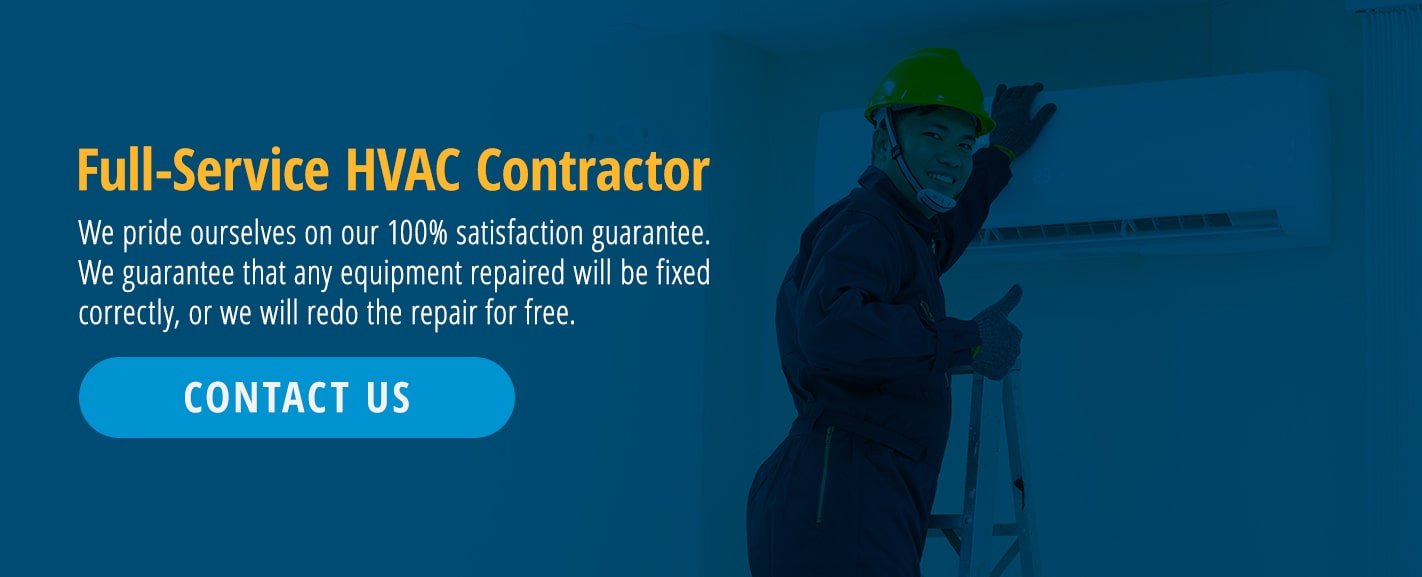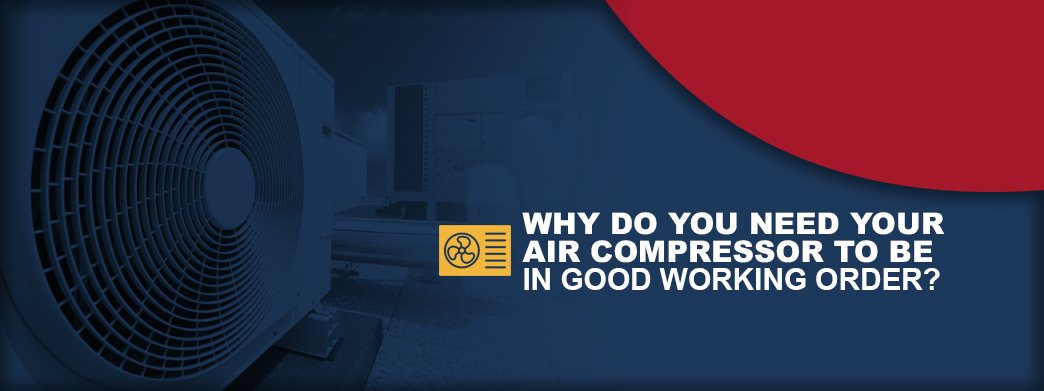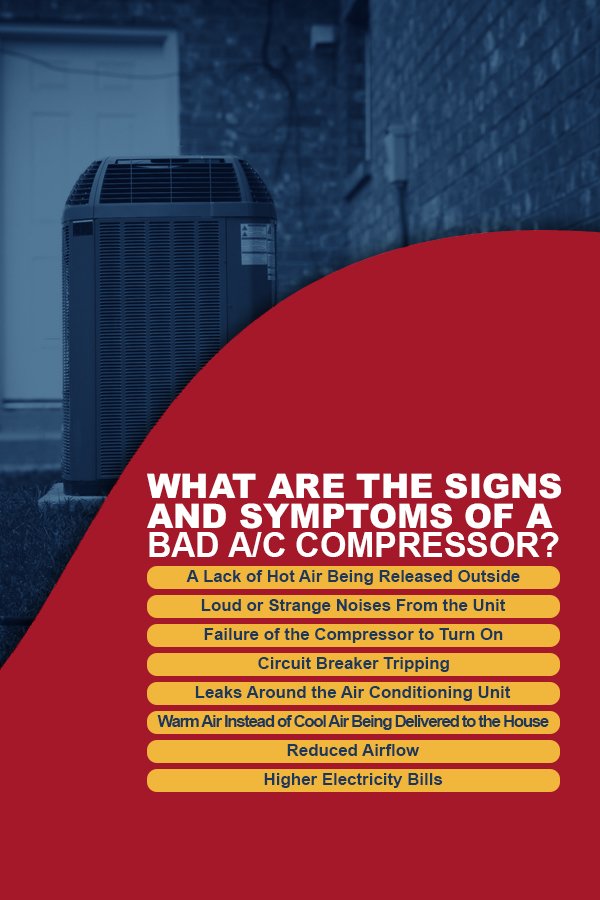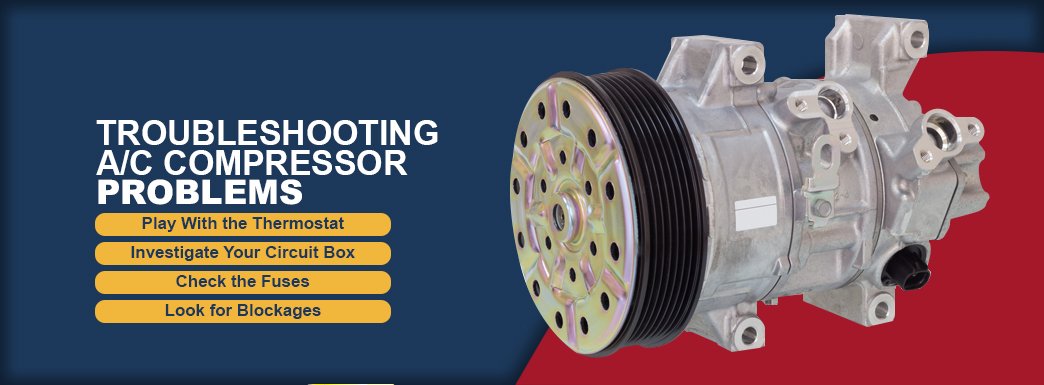Does a c Compressor 2000 Silverado Run Continuously
Table of Contents
- Why Do You Need Your Air Compressor to Be in Good Working Order?
- What Are the Signs and Symptoms of a Bad A/C Compressor?
- AC Compressor Not Turning On: Common Reasons
- Troubleshooting A/C Compressor Problems
- Are All AC Compressors the Same?
While the weather can always be a bit on the warm side in Texas, the late spring, summer and early fall months can be particularly brutal. The heat can get as high as 90 degrees Fahrenheit — sometimes even higher — during the warmest days for many days in a row. Knowing that your air conditioner is going to be performing at its very best when you need it provides peace of mind.
Many homeowners, however, are often unaware of what constitutes bad ac compressor symptoms and when their A/C units start having trouble working as it should. Among those troubles is a bad air conditioning compressor.
What's an air conditioning compressor? Basically, it's the heart of the system. It's responsible for pressurizing the refrigerant that runs through an air conditioner. It allows that refrigerant to absorb the heat from the air in your home and release it outside. It also cools air, which it then returns into your home.
Refrigerant cycles from gas to liquid back to gas. This cycle starts when the air conditioning compressor turns the low-pressure refrigerant into a high-temperature, high-pressure gas. The gas then makes its way through the condenser and turns the refrigerant into a cool liquid. The liquid enters evaporator coils, which turns it back into a cool gas. The process happens again and again, with the hot air released outside your home and the cool air pumped inside.

Why Do You Need Your Air Compressor to Be in Good Working Order?
 Some of the most important reasons follow:
Some of the most important reasons follow:
- You want your home to be cool: After all, when you purchase an air conditioner, the object is to protect you from the intense Texas heat. If your air compressor is having problems, you're not going to get all that cool air when you need it most.
- The ideal time to notice an air conditioning compressor problem is when it starts to happen: Compressors can go bad for a lot of reasons, some of which we will examine below. It could be the unit itself — perhaps the air conditioner is too old and is starting to wear out. Regardless of the reason, if you notice the compressor is starting to have problems in the early stages, you'll be able to make early repairs and avoid a large A/C compressor replacement cost. Air conditioning problems can get worse with time, so you can save money, time and cool air by spotting and fixing issues early.
- Some air compression problems can be potentially harmful to you and your family: If refrigerant leaks out of your air conditioner, the puddles it forms can be toxic and harmful to your health. If you have children or pets, you don't want them anywhere near leaking fluids, let alone a toxic refrigerant leak. Even if you don't, a refrigerant leak requires the immediate attention of a professional.
What Are the Signs and Symptoms of a Bad A/C Compressor?
As we noted above, recognizing the signs when your air conditioner's compressor might be in the early stages of breaking down or wearing out will keep your home cooler when you need it and likely result in a smaller repair bill. It's crucial to know how to tell if your A/C compressor is bad.
 Some of the signs of a bad A/C compressor are as follows.
Some of the signs of a bad A/C compressor are as follows.
1. A Lack of Hot Air Being Released Outside
When a compressor is working properly, it takes hot air from inside the home and releases it outdoors. A good way to tell if your compressor is starting to develop a problem is to hold your hand near the fan on the air conditioning unit. If that air is not hot but is instead lukewarm or cool, it's a sign that your compressor could be having problems. It could mean the unit is not compressing the gas properly.
It might also be a sign of a refrigerant leak. If you've noticed that your system has been losing cooling power over time, a refrigerant leak could be the reason. A leak causes strain on the compressor.
2. Loud or Strange Noises From the Unit
Have someone in your home turn on the air conditioning while you stand outside beside the unit. If everything is working properly, the unit will start smoothly, and you'll hear the compressor and the compressor's fan motor working properly. If the unit, however, starts vibrating or makes a rumbling noise, a popping sound, banging noises, clicking, growling, clattering or screeching noises, it could be the sign of several potential problems.
Any of these noises might signify that the A/C compressor is having electrical problems. It could also mean that the compressor or a fan is loose thrashing around in the housing. If the unit vibrates when it starts, it may mean that the compressor is "hard starting," or having problems starting — a telltale warning sign that the air conditioner compressor is about to fail. In any of these cases, you should immediately turn the air conditioning unit off and call an HVAC professional to make repairs.
3. Failure of the Compressor to Turn On
If you notice that the air conditioning is not cooling your home to the temperature you've set and the fan inside your home is working properly, check your condensing unit outside your home. If you hear the fan running but the aircon compressor is not running, you have a problem. The compressor should be clearly audible over the fan.
If this is the problem, you may face a replace or repair choice. Failed compressors can be expensive to replace so how to know if the A/C compressor is bad is vital. If your system is aging and has been in operation for about 10 or 15 years, it might make more sense to invest in a new air conditioning system rather than a costly repair.
AC Compressor Not Turning On: Common Reasons
There are many possible reasons your window AC compressor may not be turning on. Reasons your AC compressor may not be turning on include the following.
1. Power
If your fan is running but your AC compressor is not, the outer unit housing the compressor may be the culprit. The unit may not be receiving power, and the fan may continue to run.
If the AC compressor isn't starting, inspect the wiring connecting the two units. Potential causes could be a tripped circuit breaker, a blown fuse, mismatched indoor and outdoor units, a faulty thermostat or an old AC unit.
2. Dead Compressor
A dead compressor may result from an overheating unit or a faulty capacitor. If you have a dead compressor, your only option would be to replace the unit. In this case, you should always call a professional to install the replacement.
3. Capacitor and Starter Relay Problems
Your system's capacitors and starter relays are integral in supplying power to the compressor. While the capacitor provides the power needed to run the outer fan, blower motor and compressor, the starter relay transmits power to the compressor from the capacitor.
If capacitor and start relay problems cause your AC compressor not to turn on, chances are your compressor is trying to access a capacitor that is not operating properly.
4. Dirty Coil and Filters
Your AC compressor may shut down entirely due to a buildup of dirt and debris in the condenser soil, evaporators or filters. The evaporator coil may stop functioning altogether due to a blockage. Condenser coils and clogged air filters put the compressor under pressure, causing it to overheat.
If you find your AC compressor is continuously overheating, you may have to replace the unit. To allow air to flow freely, clear out obstructions and blockages, replace the air filters and wash the condenser coils.
4. Circuit Breaker Tripping
Circuit breakers are good things. A circuit breaker trips because it's protecting your home from a potential fire. Normally it happens when too many appliances run at the same time, which overloads the system. If the outside condensing unit consistently loses power and trips a circuit breaker, it may mean that the compressor is about to fail. It's a sign that the compressor is overheating and needs too much power to do its job.
When you go to the circuit breaker panel to switch the system back on, remember that if the breaker is hot, it's not a good sign. You need emergency HVAC services immediately.
5. Leaks Around the Air Conditioning Unit
Moisture or puddles spotted anywhere near your HVAC system could be an indicator of a refrigerant leak. As noted above, this issue is a potentially hazardous one that could cause health problems. Some of the problems associated with a refrigerant leak include irritated eyes, nausea, headaches and coughing. If you spot a leak, you should call an HVAC professional immediately.
A leak beside your unit might also be a sign that it has a blocked or a broken drain tube, meaning the tube can no longer rid the unit of condensation. Such a problem isn't a serious one, but don't leave it to worsen. If you do, it could lead to more serious issues like rust or mold.
6. Warm Air Instead of Cool Air Being Delivered to the House
Air conditioning compressors can fail in any one of a number of ways. Some ways allow them to continue to operate and pump air into your home. This air, however, will not be cool. If you're getting only warm air out of the air vents in your home, it's a sign that your compressor is failing or that it's low on refrigerant.
7. Reduced Airflow
Reduced airflow is another sign that your A/C compressor is failing. In fact, it's one of the best early warning signs. This one may be a little harder to notice, but put your hands near a vent to feel the flow of air. If it seems weak and not as cool as it should be, you'll know you have a compressor problem. If you hear your air conditioner working, put your hands to the vent. If you don't feel air flowing into the room, it's likely an indicator of a problem with your compressor.
8. Higher Electricity Bills
This sign of a problem is the one many homeowners notice first. An A/C system costs a lot to operate — it's probably one of your home's most expensive items. If you're using your air conditioning system as you normally would but seem to be paying more for that normal use, the problem could be the compressor. If this component is having to work harder to cool the air in your home, the unit itself will run more often and need more electricity to run, which means you'll receive higher bills.
Troubleshooting Air Compressor Issues
 In the case of most of the problems we mentioned above, the best thing to do is to call an HVAC professional and have them come look at your unit. They'll be able to diagnose the problem and make the needed repairs. Air compressor issues are not easily solved by DIYers. In fact, if you're not careful, you could hurt yourself or make the problem worse.
In the case of most of the problems we mentioned above, the best thing to do is to call an HVAC professional and have them come look at your unit. They'll be able to diagnose the problem and make the needed repairs. Air compressor issues are not easily solved by DIYers. In fact, if you're not careful, you could hurt yourself or make the problem worse.
That said, you can troubleshoot before a visit from an HVAC expert to determine whether the air conditioning compressor is failing. Here's how.
1. Play With the Thermostat
Turn your thermostat as low as it will go. Doing so should start the air conditioner. If it doesn't, it signals that you have a problem, which may be the compressor. If the unit starts but makes some of those strange or loud noises mentioned above, it signals another potential problem. If the fan is running but you don't hear the compressor running, that could be something else entirely.
2. Investigate Your Circuit Box
If you're having a hard time getting your A/C to start, it may not be a compressor problem. You should always check the circuit breaker to make sure it hasn't accidentally tripped. This situation may be the case if you have too many appliances going at the same time — the vacuum cleaner, the oven, the television and the air conditioner, for instance.
Most circuit breakers can be found in the basement, the kitchen or perhaps in a hallway or a garage. When you open it, you should see labels beside each circuit that tells you which appliance it powers. A circuit breaker switch has three positions — on, off, or in between. If the circuit breaker is in the middle, switch it off before you turn it back on. If your air conditioning starts up with no problems, you're okay, but if it keeps happening, it's time to call an HVAC professional.
3. Check the Fuses
The problem could be a blown fuse. Normally you find the fuse box on a wall on the outside of your home. If you want to check to see if the fuse is the reason the air conditioning isn't operating normally, make sure you cut the power supply to the unit — in most cases at the circuit breaker — and take out the fuse.
You'll need to use a multimeter, which you can pick up at any local hardware store. You can then perform a continuity test with the multimeter. If the multimeter says you have blown the fuse, you just need to replace the fuse.
If the circuit breakers and the fuses are all operating properly, you'll know a faulty compressor is probably the cause of your air conditioning problems.
4. Look for Blockages
If you've tried all the above measures, check the compressor's condensing coil and fans to make sure there are no blockages or obstructions. Branches or even too many leaves can create blockages that undermine the air conditioning compressor's ability to do its job.
Are All AC Compressors the Same?
AC compressors are not all the same. You have your car's AC compressor, your home AC and, of course, HVAC.
Home air conditioners and vehicle air conditioners operate based on the same principle — removing hot air from inside the home or vehicle and emitting it outside. Both systems are similar in function and design and consist of:
- An evaporator: An evaporator coil absorbs the heat from any indoor air that passes through the system and comes into contact with it.
- A condenser: After heat is absorbed, it is directed to the condenser coil, where it is cooled. The heat is then able to escape.
- A compressor: The compressor consolidates the refrigerant, heating it until it becomes vapor.
While a home air conditioning system is designed to cool an entire house, a vehicle air conditioning system is made to cool a 6-foot by 6-foot space.
Heating, Ventilation and Air Conditioning (HVAC) refers to the various systems used to cool and heat commercial and residential buildings and move air between outdoor and indoor areas.
Contact the HVAC Professionals at A/C Contractors Air Conditioning and Heating
If you're not getting the cooling power you've always had, you don't want to wait to see if it will just fix itself. Problems can get worse over time. If you make repairs early in the process, it's likely to cost you less money than it would if you waited until the last possible second. Not to mention that you'll need to live with a much warmer house if you wait.
The certified HVAC technicians who work for A/C Contractors Air Conditioning and Heating — we call them our "Do It Right Guys" — work with state of the art technology. They can use this technology to diagnose the problems with your system, such as a failing or a bad compressor, and then repair it. They also use top-of-the-line equipment for installations and repairs.
We also provide our patented Straight Forward Pricing Guide™, so you'll always know how much the repair is going to cost in advance. We'll never charge you by the hour, and we'll fix it right or it's free. That's our 100% satisfaction guarantee.
If you live in the Longview or Tyler area and you want to talk to us about your air conditioning problems, or if you're interested in setting up a regular maintenance program for your air conditioning unit, you can call us in Longview at 903-759-4250, in Tyler at 903-581-9537 or toll-free at 800-287-0715. If you're not sure which number to use, call the Longview number.
You can also visit our contact us page, where you can leave us some of your details, tell us a little bit about your problem, sign up for our newsletter or learn about our money-saving promotions. A member of our team will get back to you as soon as possible.

Source: https://accontractors.com/ac-repairs/symptoms-of-a-bad-a-c-compressor/
0 Response to "Does a c Compressor 2000 Silverado Run Continuously"
Post a Comment